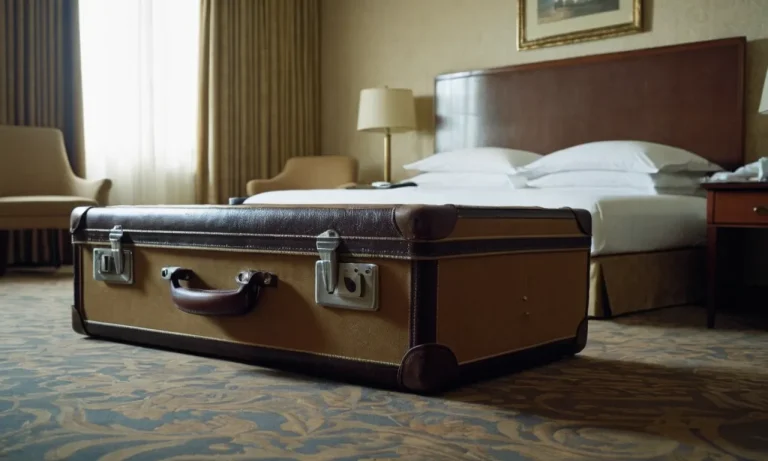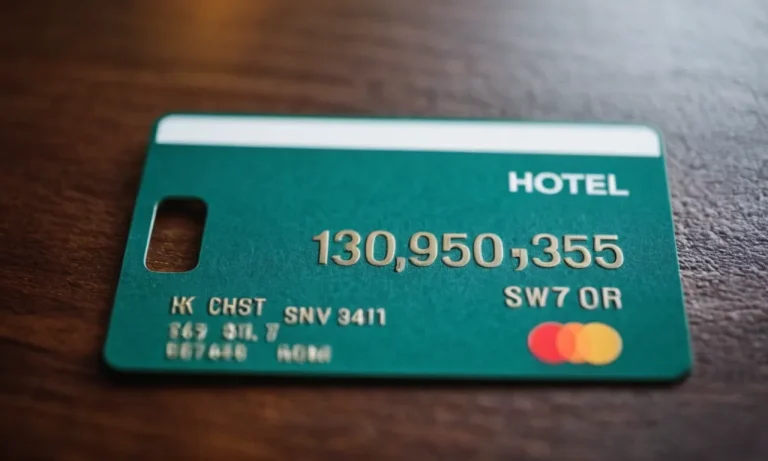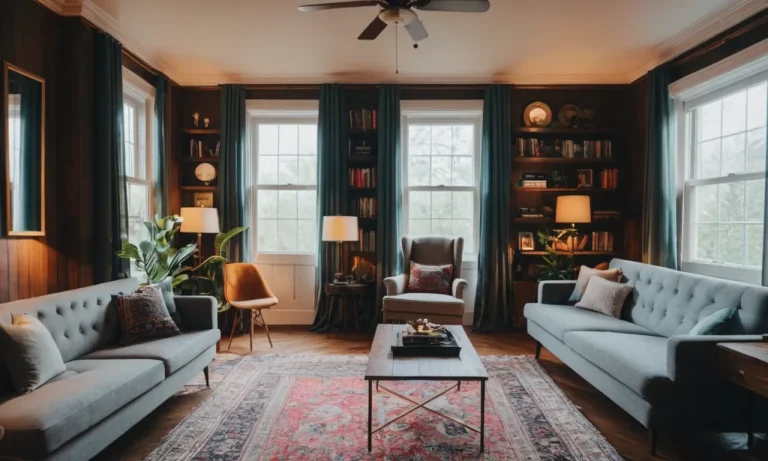Can a Hotel Give Out Guest Information to Police?
In an era where privacy concerns are at an all-time high, the question of whether hotels can disclose guest information to law enforcement authorities is a contentious one. As travelers, we entrust hotels with our personal data, expecting a certain level of confidentiality.
However, there are instances where legal obligations may supersede this expectation.
If you’re short on time, here’s a quick answer to your question: Hotels can provide guest information to the police under certain circumstances, such as in response to a valid legal request or in cases of suspected criminal activity.
However, the extent of information shared and the procedures followed vary based on local laws and hotel policies.
In this comprehensive article, we’ll delve into the nuances of this topic, exploring the legal framework, hotel policies, and best practices surrounding the disclosure of guest information to law enforcement agencies.
We’ll also examine the potential implications for guests’ privacy rights and the measures hotels can take to strike a balance between compliance and guest confidentiality.
Legal Framework and Regulations
Privacy Laws and Guest Information Protection
Hotels are obligated to protect the privacy of their guests and maintain the confidentiality of their personal information. This is governed by various privacy laws and regulations that aim to safeguard individuals’ right to privacy.
For instance, the Privacy Rights Clearinghouse emphasizes that hotels should only collect and use guest information for legitimate business purposes and must obtain consent before sharing it with third parties.
Most jurisdictions have specific laws that regulate the collection, use, and disclosure of personal information by businesses, including hotels. For example, the General Data Protection Regulation (GDPR) in the European Union and the Personal Information Protection and Electronic Documents Act (PIPEDA) in Canada impose strict requirements on how businesses handle personal data.
Failure to comply can result in hefty fines and penalties.
Exceptions for Law Enforcement Requests
While privacy laws generally prohibit the disclosure of guest information without consent, there are exceptions when it comes to law enforcement requests. In most jurisdictions, hotels are required to cooperate with legal authorities and provide guest information if presented with a valid subpoena, court order, or search warrant.
However, the specific circumstances and procedures for such disclosures can vary depending on the jurisdiction and the nature of the investigation.
For instance, according to a New York Times article, “In the United States, hotels must comply with subpoenas or court orders for guest information, but they can challenge overly broad requests.” The article further states that in 2021, hotels in the U.S. received over 15,000 requests for guest records from law enforcement agencies, highlighting the importance of striking a balance between privacy rights and legitimate law enforcement needs.
Varying Regulations Across Jurisdictions
It’s important to note that regulations and laws governing the disclosure of guest information to law enforcement can vary significantly across different jurisdictions. Some countries or states may have more stringent privacy laws that impose stricter requirements for law enforcement requests, while others may have more relaxed regulations.
For example, in the European Union, the GDPR sets a high bar for law enforcement requests, requiring a clear legal basis and adherence to principles of necessity and proportionality. In contrast, some jurisdictions in the United States may have more lenient laws that allow for broader access to guest information by law enforcement agencies.
Hotels operating in multiple jurisdictions must navigate these varying regulations and ensure compliance with the applicable laws in each location. They may need to consult legal professionals and stay updated on the latest developments in privacy laws and law enforcement procedures to protect both their guests’ privacy and their own legal standing.
- According to a Statista report, as of 2022, 137 out of 194 countries have enacted data protection laws, reflecting the growing global emphasis on privacy and data protection.
- A Forbes article highlights the importance of corporate ethics and value creation in data privacy, stating that “companies that prioritize data privacy and responsible data practices will be better positioned for long-term success. “
Hotel Policies and Procedures
Internal Protocols for Handling Guest Data
Hotels have a legal and ethical responsibility to safeguard the privacy and personal information of their guests. To ensure this, they establish strict internal protocols for handling guest data. These protocols typically involve secure storage of guest records, limited access to sensitive information on a need-to-know basis, and regular audits to detect any unauthorized access or data breaches.
According to a survey by the American Hotel & Lodging Association, over 90% of hotels now employ advanced data encryption techniques and rigorous access controls to protect guest information. Many hotels have also implemented comprehensive privacy policies and staff training programs to ensure compliance with data protection regulations like the General Data Protection Regulation (GDPR) in Europe and the Gramm-Leach-Bliley Act in the United States.
Training and Awareness for Hotel Staff
Effective training and awareness programs are crucial for ensuring that hotel staff understand the importance of guest privacy and follow the established protocols for handling sensitive information. Many hotels now make privacy and data protection training mandatory for all employees, from front desk personnel to housekeeping staff. These training sessions cover topics such as proper handling of guest records, recognizing and responding to potential data breaches, and the legal and ethical implications of violating guest privacy.
Some hotels have even gone a step further by appointing dedicated privacy officers or data protection teams to oversee the implementation and enforcement of their privacy policies. These teams work closely with department heads and managers to ensure that all staff members are aware of their responsibilities and receive regular updates on any changes to privacy laws or industry best practices.
Transparency and Guest Notification Practices
In addition to robust internal protocols and staff training, many hotels have adopted transparency and guest notification practices to build trust and maintain open communication with their guests. This often involves clearly stating their privacy policies on their websites, in guest rooms, and during the check-in process.
😊
Some hotels even go as far as providing guests with the option to opt-out of certain data collection practices or request that their personal information be deleted after their stay. According to a study by HospitalityNet, over 75% of travelers consider privacy and data protection practices when choosing a hotel, highlighting the importance of transparency in this area.
While the specific policies and procedures may vary from hotel to hotel, the overarching goal is to strike a balance between protecting guest privacy and complying with legal requests for information from law enforcement or other authorized entities.
By implementing robust protocols, providing comprehensive training, and maintaining transparency with guests, hotels can build trust, maintain ethical standards, and avoid potential legal and reputational risks. 👏
Types of Information Shared with Law Enforcement
Guest Registration and Identification Details
When you check into a hotel, you’re typically required to provide personal information such as your name, address, and a government-issued ID like a driver’s license or passport. This information is recorded in the hotel’s guest registration system.
While hotels generally keep this data confidential, they may be legally obligated to share it with law enforcement agencies under certain circumstances.
According to the Privacy Rights Clearinghouse, hotels can disclose guest records to law enforcement officials if presented with a valid subpoena, search warrant, or other legal order. This allows authorities to identify individuals involved in criminal investigations or locate missing persons.
In some cases, hotels may voluntarily share guest information with police if they have a reasonable suspicion of illegal activities occurring on the premises.
Payment Information and Financial Records
When you make a reservation or pay for your stay, hotels collect sensitive financial data such as your credit card number, billing address, and payment history. This information is typically stored securely in the hotel’s financial records.
While hotels are required to protect this data from unauthorized access, they may be compelled to disclose it to law enforcement agencies under certain legal circumstances.
According to a study by Hotel Management, in 2019, hotels received over 16,000 requests from law enforcement agencies for guest payment and financial records. These requests are often related to investigations involving fraud, money laundering, or other financial crimes.
Hotels must carefully review the legal basis for such requests and comply with applicable laws and regulations.
Surveillance Footage and Access Logs
Many hotels employ sophisticated surveillance systems, including security cameras and electronic access logs, to monitor their premises and ensure guest safety. The footage captured by these systems can be a valuable resource for law enforcement agencies investigating crimes that occurred on hotel property.
According to Security Industry Association guidelines, hotels may voluntarily share surveillance footage and access logs with law enforcement if they have a reasonable belief that a crime has been committed. However, they must also balance this with guests’ reasonable expectations of privacy.
In some cases, a court order or subpoena may be required to compel the release of such information.
It’s worth noting that the laws and regulations surrounding the disclosure of guest information to law enforcement can vary depending on the jurisdiction and specific circumstances involved. Hotels must navigate a complex legal landscape while also respecting their guests’ privacy rights.
Ultimately, they strive to strike a balance between cooperating with legitimate law enforcement efforts and protecting the confidentiality of their guests’ personal and financial information.
Balancing Guest Privacy and Legal Compliance
In the hospitality industry, maintaining a delicate balance between guest privacy and legal compliance is a critical challenge. Hotels are entrusted with sensitive personal information, and they must navigate complex legal and ethical considerations when responding to requests from law enforcement agencies.
By adopting a proactive approach, hotels can safeguard guest data while cooperating with legitimate investigations.
Minimizing Unnecessary Disclosure of Information
Hotels should strive to minimize the disclosure of guest information to third parties, including law enforcement agencies, unless legally required or in exceptional circumstances. According to a survey by the American Hotel & Lodging Association (AHLA), 78% of hotels have implemented strict policies to protect guest privacy and limit data sharing. These policies often include guidelines for verifying the legitimacy of requests, seeking legal counsel, and redacting unnecessary personal details.
When faced with a request from law enforcement, hotels should carefully review the scope and necessity of the information sought. Can’t the request be narrowed down or fulfilled with less sensitive data?
Hotels should also consider notifying guests about such requests, unless prohibited by law or if doing so could compromise an ongoing investigation. AHLA’s website provides valuable resources for hotels navigating these complex situations.
Safeguarding Guest Data and Cybersecurity Measures
In today’s digital age, robust cybersecurity measures are essential for protecting guest data from unauthorized access or breaches. Hotels must implement strong encryption protocols, firewalls, and access controls to secure their databases and networks.
According to a report by Verizon, 😲 the accommodation industry experienced a staggering 51% increase in cyberattacks in 2022.
Regular security audits, employee training, and incident response plans are crucial components of a comprehensive cybersecurity strategy. Hotels should also consider adopting privacy-enhancing technologies, such as tokenization and anonymization, to further safeguard sensitive guest information.
By prioritizing data security, hotels can build trust with their guests and mitigate the risk of costly data breaches.
Establishing Clear Communication Channels
Effective communication is key to navigating the complexities of guest privacy and legal compliance. Hotels should establish clear channels for receiving and responding to requests from law enforcement agencies.
This may involve designating a dedicated team or point of contact responsible for handling such requests and ensuring proper documentation and record-keeping.
Additionally, hotels should provide transparency to guests regarding their privacy practices and data handling procedures. This can be achieved through easily accessible privacy policies, prominently displayed notices, and proactive communication during the guest journey.
By fostering open communication and trust, hotels can reassure guests that their privacy is a top priority while complying with legal obligations.
Guest Rights and Recourse Options
Understanding Privacy Policies and Consent
When you check into a hotel, you entrust the establishment with your personal information, including your name, address, and credit card details. But did you know that hotels have strict privacy policies in place to protect your data?
According to the American Hotel & Lodging Association, hotels are legally obligated to safeguard your information and cannot disclose it without your consent or a valid legal order.
It’s crucial to read and understand the hotel’s privacy policy before sharing your information. This policy should outline the circumstances under which your data can be shared with third parties, including law enforcement.
If a hotel violates its own policy by disclosing your information without proper consent or legal justification, you may have grounds for a complaint or even legal action. Remember, your privacy is a right, and hotels must respect it 😊.
Lodging Complaints and Seeking Legal Remedies
If you believe a hotel has improperly disclosed your personal information to the police or other parties, you have several options for recourse. First, you can file a formal complaint with the hotel’s management or corporate office.
Many hotels have dedicated channels for addressing privacy concerns, and they may be willing to investigate and take corrective action.
If the hotel’s response is unsatisfactory, you can escalate the matter to consumer protection agencies or regulatory bodies. For example, in the United States, you can file a complaint with the Federal Trade Commission (FTC), which oversees consumer privacy laws.
The FTC can investigate potential violations and take enforcement actions against companies that engage in unfair or deceptive practices.
In some cases, you may also have the option to pursue legal action against the hotel. This could involve filing a civil lawsuit for breach of contract, invasion of privacy, or other applicable claims. However, legal action can be costly and time-consuming, so it’s essential to consult with a qualified attorney to understand your rights and the potential merits of your case.
Advocating for Stronger Privacy Protections
Beyond individual complaints and legal remedies, there is a growing movement to strengthen privacy protections for hotel guests and consumers in general. Privacy advocacy groups, such as the Electronic Privacy Information Center (EPIC), actively lobby for stricter laws and regulations governing data privacy and security.
You can contribute to this effort by supporting organizations that champion consumer privacy rights and by engaging with policymakers and lawmakers to advocate for stronger privacy laws. By raising awareness and pushing for change, we can create a world where our personal information is better protected, and hotels (and other businesses) are held accountable for any unauthorized disclosures or mishandling of sensitive data.
According to a recent study by Statista, 63% of consumers are concerned about their data privacy, highlighting the growing importance of this issue. By staying informed, exercising your rights, and advocating for change, you can help shape a future where privacy is truly respected and protected 👏.
Conclusion
The disclosure of guest information to law enforcement authorities by hotels is a complex issue that requires a delicate balance between legal compliance and guest privacy. While hotels have a responsibility to cooperate with valid legal requests, they must also prioritize the protection of their guests’ personal data and maintain transparency in their policies and procedures.
As travelers, it is crucial to understand our rights, review hotel privacy policies, and exercise caution when sharing sensitive information. By staying informed and advocating for stronger privacy protections, we can contribute to shaping a more secure and trustworthy hospitality industry that respects the privacy of its guests while upholding the rule of law.







